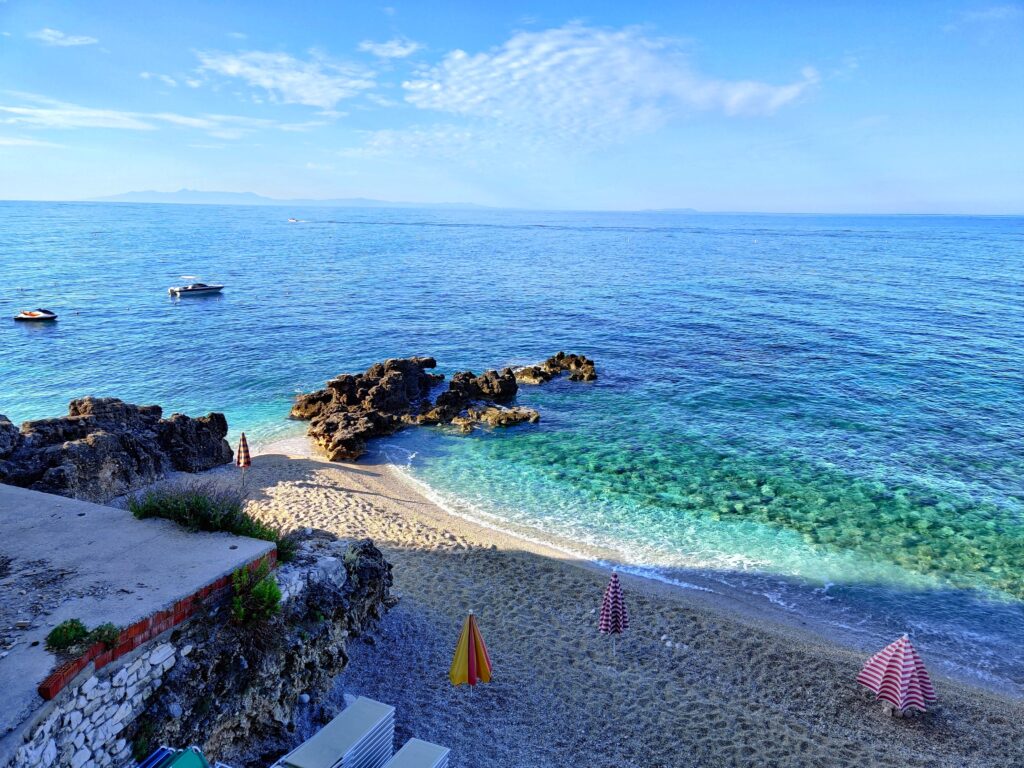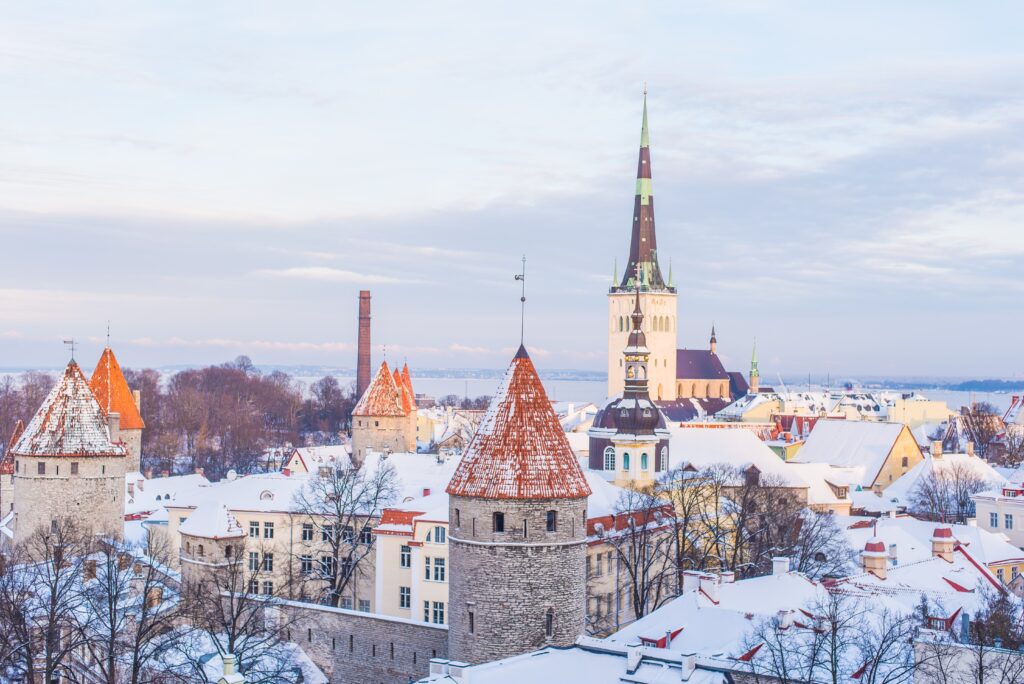With this post, I want to give you the ultimate list of the best digital nomad visas in Europe.
I have put together a list of the different digital nomad visas in Europe. I also included the basic requirements, the length of the visa and any tax implications that comes with them.
However, let’s first dive into the fact why a digital nomad visa is important and where it differs from a traditional work visa.
A Primer on Digital Nomad Visa Programs in Europe
Many people travel and stay in a country on a tourist visa. If we talk about Europe, for example, many people can stay for 90 days in Europe during a period of 180 days on a tourist visa. However, if you want to stay longer, you’ll need some long-term visa or residency permit.
Digital nomad visas cater for this. They are specifically designed for people who have a digital job which they can perform location independent.
Therefore, they will not be able to apply for a traditional work visa. The reason is that these are reserved for people who have a contract with a local company. So, a digital nomad visa is basically a work visa for people with a remote job.
Therefore, a digital nomad visa explicitly allows you to work remotely from that country. Under tourist visas it’s not always clear if this is allowed.
Before we’ll go into the actual list of countries in (geographical) Europe, you should be aware that if you are a citizen of a country of the Schengen Area you don’t need a visa to travel around these countries because of the rule of free movement of people.
However, do note that if you are planning to stay long-term, you might have to fulfill some formalities like registering yourself with local authorities.
Best Digital Nomad Visas in Europe
There are many digital nomad visas in Europe that are interesting. I’ve picked the best digital nomad visas in Europe considering different factors.
Albania
The first country on the list of best digital nomad visas in Europe is Albania.
Albania is located on South-eastern Europe’s Balkan Peninsula at the Adriatic Sea. It borders, among others, Greece and Montenegro. The capital of Albania is the vibrant city of Tirana.
Apart from the beautiful cities like Berat, Gjirokaster, Korce and Shkodër which are located inland you will mainly find gorgeous beaches all over Albania. These beaches are real contenders to the like of the more known ones in Croatia or Greece.
Albania wants to attract more digital nomads. Hence, they launched a digital nomad visa in 2022.
The Albanian digital nomad visa, also called ‘Unique Permit’, is not only directed towards digital nomads. Also pensioners or real estate investors could for example apply for the visa.

- Minimum income: no minimum income level but sufficient to cover your living expenses. For pensioners the minimum level of income is 1.200.000 ALL (around €10.000) per year so an income of around €850 per month is probably a good measure to make sure your visa gets approved.
- Other: You need proof of accommodation in Albania for the duration of your stay and demonstrate your ability to work digitally.
- Visa length: The Albanian digital nomad visa is initially granted for a period of one year. Afterwards, you can extent multiple times and eventually even apply for permanent residence.
- Tax implications: You can end up an Albanian tax resident based on the 183-days test. You can find more information on tax residency in Albania in my dedicated article.
- Schengen Area: No
You can find more information the Albanian digital nomad visa in this article or have a look at the website of the Albanian government and launch your application there.
In order to apply, click on the tab for ‘Long stay visa’ and look for the ‘visa for digital mobile workers’.
Croatia
Croatia is another country on the list of best digital nomad visas in Europe.
It is situated on the verge of Central Europe and Southeast Europe and offers stunning nature and beaches. No wonder it is a popular destination amongst digital nomads.

- Minimum income: The minimum income you should demonstrate is at the time of writing equal to €3.295 per month. You could also show sufficient savings of this amount as an alternative.
- Other: You should demonstrate you have a health insurance, a clean criminal record and can work remote. You’ll also have to include an (initial) Croatian address in the application.
- Visa length: The maximum duration of the Croatian digital nomad visa is 18 months, extendable for another 18 months. Afterwards you have to leave Croatia for at least 6 months before you can apply again.
- Tax implications: The Croatian legislation includes a specific provisions which states that your income is tax exempt. Furthermore, the exemption only applies if you can show you still pay taxes in your home country / somewhere else.
- Schengen Area: Yes
For more information, you can check out my dedicated article on the Croatian digital nomad visa.
Furthermore, you can also find more information on the website of the Croatian Ministry of Internal Affairs.
Cyprus
Cyprus is an island in the Mediterranean Sea in front of the coast of Turkey. Due to its location, its climate is mild year round.
Cyprus offers a digital nomad visa to citizens who come from outside the Schengen Area who can work remote for clients abroad.

- Minimum income: In order to qualify for the digital nomad visa in Cyprus you will need a minimum net income of €3.500 per month.
- Other: Provide a copy of your criminal record, health insurance and proof of accommodation. Furthermore, you will also need to provide the results of a blood analysis and a chest X-ray. This should confirm you don’t suffer from an infectious disease or tuberculosis.
- Visa length: Cyprus grants a digital nomad visa for one year. The visa can be renewed for two more years.
- Tax implications: Cyprus considers you a tax resident if you spend more than 183 days in the country during a calendar year. However, in some cases you could even qualify as a tax resident already after only spending 60 days in the country. This could be interesting for digital nomads who want to set up their tax residency in Cyprus.
- Schengen Area: Not yet, planning to join in 2026 but not confirmed yet.
You can find more information on the procedure and the documents to apply for the Cypriot digital nomad visa on the website of the government of Cyprus.
Note that Cyprus only grants 500 visas per year. Therefore, you would make most chance if you apply in the beginning of the year.
Czech Republic
The Czech Republic is located in Central Europe and mainly its capital, Prague, is a favourite with digital nomads but also for tourists in general.
So, we didn’t have a choice than to include the Czech Republic in the list of best digital nomad visas in Europe.

- Minimum income: There is no minimum income requirement as such. However, you should demonstrate you have sufficient means by providing proof that you have at least 124.500 CZK (around €5.000) in your bank account.
- Other: The Czech digital nomad visa is actually more a long-term residence permit. Therefore, you need to apply with your local embassy. The residency permit will be linked to a trade license (freelance registration). Furthermore, you’ll also have to include proof of accommodation in the Czech Republic for the entire duration of your stay, a clean criminal record and health insurance.
- Visa length: The length of the visa depends on the length of your trade license and can be from six months up to one year. If you want to extend your stay, you’ll first have to renew your trade license.
- Tax implications: As you are holding a trade license for the Czech Republic and are probably spending a decent amount of time in the country, you’ll qualify as a Czech tax resident. Yet, this doesn’t need to be a bad thing as the Czech Republic offers attractive rates for freelancers.
- Schengen Area: Yes
All the steps for the application process are written down on the website of the Ministry of Foreign Affairs of the Czech Republic.
Estonia
Estonia was the first country to launch a digital nomad visa back in June 2020. Already for this reason alone, Estonia deserves to be on the list of best digital nomad visas in Europe.
Apart from its digital nomad visa, Estonia also offers an e-residency program for foreign entrepreneurs. However, this is something totally different than the digital nomad visa and shouldn’t be confused with it.
In my dedicated article you’ll also read that I am not the biggest fan of the Estonian e-Business.
Estonia is one of the Baltic countries and lays next to the Baltic Sea.

- Minimum income: In order to be eligible for the Estonian digital nomad visa, you will have to proof that you have a net minimum income of €4.500 per month for the last six months prior to your application.
- Other: Apart from the income, you need proof of remote work. As usual, you’ll also have to demonstrate you hold valid health insurance, have accommodation for the duration of your stay and have no criminal record. In addition, Estonia also asks to provide a copy of your university degree or other education.
- Visa length: The duration of the digital nomad visa is one year and you can extent it with another six months.
- Tax implications: The normal tax rules apply. Accordingly, if you spend more than 183-days in Estonia, you will be deemed a tax resident and liable to taxes there.
- Schengen Area: Yes
Estonia is on the forefront of digitalization. Also for the Estonian digital nomad visa, they created a specific website to provide you with guidance.
Finland
Finland is one of the Nordic countries and if you visit the Lapland Province at the right time, you’ll be able to see the Northern Lights there.
The Finnish digital nomad visa is actually a visa for self-employed people so it isn’t available for people working as a remote employee.

- Minimum income: There is no exact minimum income requirement.
- Other: You should prove of health insurance, as well as a local address in Finland where you’ll be staying.
- Visa length: The Finnish digital nomad visa is valid for up to twelve months and is renewable.
- Tax implications: You will be a tax resident in Finland if you have your habitual abode there or when you spend more than six months in the country.
- Schengen Area: Yes
You can apply for the Finnish self-employed digital nomad visa via this website.
Georgia
The country of Georgia is situated on the intersection of Eastern Europe and Western Asia. You should not mistake it for the state in the US.
The capital, Tbilisi, starts becoming very popular with digital nomads. However, if you’re into nature or beaches, you’ll definitely also find something for your taste in Georgia. Also, the cost of living in Georgia is at the lower end.
Fun fact: multiple digital nomads have confirmed that in the past they got a free bottle of Georgian wine upon there first arrival in the country. If that isn’t a nice welcome!
Please note that Georgia used to offer a digital nomad visa during COVID-19. This visa was ended and you might find some outdated information in this respect on the internet.
Here, we are referring to a scheme where you can stay in Georgia for one year without a visa.

- Minimum income: There is no income requirement
- Other: You should have a passport of one of the qualifying countries for visa free access to Georgia.
- Visa length: The length of the Georgian digital nomad visa is one year.
- Tax implications: If you are staying more than 183-days in Georgia, you will qualify as a Georgian tax resident and thus you will be paying Georgian income tax. You can read all the details and potential benefits of the Georgian tax system in my dedicated post.
- Schengen Area: No
Germany
Germany is a country located in Central Europe and is one of the economic powers of Europe.
The German digital nomad visa or freelance visa will allow you to live in Germany while working remotely.
Actually, the visa is split up in two categories.
First you apply for a freelancer entry visa which allows you to enter Germany. The entry visa is typically valid for just three months.
Next, you apply for the freelancer resident permit.

- Minimum income: You’ll need to make at least €9.000 per year in income which is a rather low amount compared to general living expenses in Germany.
- Other: You’ll need to provide proof of accommodation in Germany. Besides, you’ll need letters of two clients confirming they intend to hire you. This is a rather burdensome requirement for which you will have to bother your clients.
- Visa length: The freelancer residence permit is valid for up to three years.
- Tax implications: Germany considers you a tax resident if you have a dwelling (owned or rented) available to you there or when you spend more than 183-days there consecutively or in one calendar year.
- Schengen Area: Yes
There is an official website where you can find more information about the German digital nomad visa.
Greece
You’ll probably know Greece as the country with countless beautiful islands and the impressive beaches that come with it.
Alongside it’s a country with a long history of which remains can be found all over the country.

- Minimum income: The income requirement for the digital nomad visa is €3.500 per month, after taxes.
- Other: For the digital nomad visa you need to prove valid health insurance, clean criminal record and proof of accommodation. In addition, you will also need a return flight ticket and need to disclosure the activities/job you plan to perform remotely.
- Visa length: You will get the digital nomad visa for one year. Afterwards, you can extent up to a maximum of three years in total.
- Tax implications: If you plan to spend the majority of the year in Greece or settle there, you’ll become liable to Greek taxes. You can learn more about it in my article on tax residency in Greece.
- Schengen Area: Yes
You can read more details about the Greek digital nomad visa in my dedicated article.
Furthermore, you can check the website WorkFromGreece.
Hungary
Hungary is most known for its capital Budapest. The cities comes with a long history which you can still experience in many of the historical buildings around the city. The most famous is probably the Hungarian Parliament Building.
The Hungarian digital nomad visa is also called White Card.

- Minimum income: The income requirement to obtain the Hungarian digital nomad visa is €3.000 per month. You will need to prove this level of income for the past six months prior to your application.
- Other: You’ll need to have health insurance, proof of accommodation and also a return ticket. If you are an employee you will need to provide a copy of your contract and the scope of your work. Freelancers and business owners need to provide documents about the scope of their operations.
- Visa length: The visa is initially valid for one year. If you obtain the visa, you are obliged to stay at least 90 days in Hungary within a 180-day period.
- Tax implications: You will not qualify as a tax resident and will not pay income taxes if you spend less than six months in Hungary. Once you surpass this limit, you will qualify as a Hungarian tax resident.
- Schengen Area: Yes
You can go to the website of the Hungarian government to apply for your Hungarian White Card.
Iceland
Iceland is home to some of the most scenic landscapes. In the “land of fire and ice” you’ll get the whole range of waterfalls, glaciers and volcanos.
So if you are up to exploring this magical country, you might want to apply for their digital nomad visa. I’ll already tell you, though, that it doesn’t come cheap.

- Minimum income: The minimum income for the Iceland digital nomad visa is 1.000.000 ISK (around €7.000) per month for a single applicant.
- Other: Along with the high income requirement, you will need a valid health insurance, a clean criminal record and submit prove that your main purpose of your stay is to work remotely.
- Visa length: The length of the Iceland digital nomad visa is only six months.
- Tax implications: As you can only stay in Iceland for maximum six months on the digital nomad visa you will not become a tax resident there.
- Schengen Area: Yes
Also Iceland has a nice, clear website in place where you can find more information about remote working in Iceland.
Italy
If you want to experience the authentic Italian kitchen, dive into the history of the Roman Empire or just want to relax when enjoying picturesque landscapes, Italy will definitely not disappoint you.

- Minimum income: In order to apply for the Italian digital nomad visa you need earn a minimum of €28.000 per year.
- Other: You’ll have to show a clean criminal record and health insurance when applying for the visa. Furthermore, you should have pre-booked accommodation for your whole stay. And, you need to proof you have been working remote for at least six months already.
- Visa length: The initial duration of the Italian digital nomad visa is one year. You can renew the visa if all conditions are still met. After five years, you could even opt to apply for permanent residence.
- Tax implications: People moving to Italy on the digital nomad visa will qualify as tax resident in Italy.
- Schengen Area: Yes
You can read all the details about the Italian digital nomad visa here.
Malta
Malta is an island in the Mediterranean Sea between Sicily and North-Africa.
Because of its location, it has a year-round mild climate with some higher temperatures (30°C) in summer and 300 days of sunshine. As it is an island, there is also no shortage in beaches.
Also good to know is that one of the official language is English so you’ll definitely be able to communicate with the local population.

- Minimum income: The minimum income requirement to apply for the visa is €3.500 per month.
- Other: You will have to show proof of health insurance and accommodation. In addition, the Maltese authorities will perform a background check on you.
- Visa length: The validity of the Maltese digital nomad visa is one year. Yet, you can renew the visa.
- Tax implications: Malta offers a specific tax exemption for digital nomads.
- Schengen Area: Yes
You can learn more about the Malta digital nomad visa in this article or check out the official website about the nomad residence permit.
Norway
Norway is – as its name suggests – a Nordic country in Northern Europe and you’ve probably already seen some pictures of its majestic fjords.
The Norwegian digital nomad visa is only issued to self-employed contractors. So if you are a remote employee, you will not qualify for this visa.

- Minimum income: The minimum income requirement in order to be eligible for the visa is around €40.000 per year.
- Other: You’ll need to provide an address for your stay in Norway. Furthermore, there is the requirement that you should have at least one Norwegian client for a remuneration which is equal to at the least the Norwegian minimum wage for a skilled worker.
- Visa length: The length of the independent contractor visa is twelve months and is renewable.
- Tax implications: If you live in Norway based on the independent contractor visa, you will qualify as a Norwegian tax resident. Thus, will have to pay taxes in Norway. Consequently, it is recommended that you look into what this exactly means for you before applying for your visa.
- Schengen Area: Yes
You can find the checklist for your application for the Norwegian digital nomad visa here.
Portugal
Good weather, delicious food an nice beaches and nature, just some of the reasons why Portugal is a favorite under digital nomads.
Apart from mainland Portugal, you could also visit the islands of the Azores or Madeira with the Portuguese digital nomad visa.

- Minimum income: The minimum income requirement is equal to four times the Portuguese minimum wage. Therefore, your your minimum disposable income should amount to €3.480 per month.
- Other: In addition, you must also provide a clean criminal record, proof of accommodation and valid health insurance. Moreover, you will need to provide confirmation of your tax residence by the local authorities of your country of tax residence.
- Visa length: You will get a visa for one or two years which you can renew. After five years, you could apply for a permanent residence permit.
- Tax implications: If you move to Portugal on the digital nomad visa the chances are high you’ll end up as a Portuguese tax resident.
- Schengen Area: Yes
You can find information in my dedicated article on the Portuguese digital nomad visa or check the website of the Portuguese Ministry of Foreign Affairs.
Romania
What most people don’t know is that Romania is the country in Europe with the fastest broadband internet speed. Already this reason alone is sufficient to put is on the list of best digital nomad visas in Europe.
Romania is currently still somewhat of a hidden gem but this might change once people get know about the country.
The Romanian digital nomad visa will definitely help with attracting digital nomads to their country.

- Minimum income: The minimum income requirement is equal to three times the average Romanian salary. Therefore, your minimum income should equal at least €3.700 per month
- Other: Along with the proof of your income, you’ll need to provide a copy of your employment contract or proof of self-employment. You should also provide proof of a clean criminal record and accommodation in Romania for the duration of your stay.
- Visa length: The length of the Romanian digital nomad visa is one year and you can renew for one additional year.
- Tax implications: As long as you can prove tax residency in another country, you don’t have to pay income taxes in Romania. Yet, maybe you do want to become a Romanian tax resident as it offers some beneficial tax regimes.
- Schengen Area: Yes
You can apply online for your Romanian digital nomad visa.
Spain
The final country on our list is Spain. The country probably doesn’t need a lot of introduction.
Amongst Europeans Spain is already a well-known holiday destinations and during the pandemic a lot of people started working remotely from Spain. In order to also attract digital nomads from outside of the Schengen Area, Spain launched its digital nomad visa.
The digital nomad visa is part of a broader package of new rules in order to stimulate entrepreneurship in the country and attract foreign talent.

- Minimum income: The minimum requirement is twice the minimum age. Currently, your income should be at least €2.763 per month
- Other: Provide proof of working remote. The exact documents will differ if you work as an employee or a freelancer.
- Visa length: The digital nomad visa itself is valid for one year. Yet, you can convert it to a nomad residency permit. This one you can extend for two more years.
- Tax implications: If you plan to live in Spain and get your residency permit you will qualify as a Spanish tax resident.
- Schengen Area: Yes
You can learn more here about the digital nomad visa Spain.
In addition, you can have a look at the website of the Spanish Ministry of the Exterior.
Common Mistakes When Applying For a Digital Nomad Visa
If you want to apply for a digital nomad visa you want to avoid the following mistakes.
Not Meeting the (Income) Requirements
The first common mistake is not meeting the income threshold.
For most of the best digital digital nomad visas in Europe you’ll have to proof that you have consistent and stable income meeting the minimum income requirement. Irregular income or just savings will most of the time not be taken into consideration.
Apart from the income requirement, you also have to make sure you meet the other requirements.
Incomplete Documentation
You don’t only need to meet certain requirements, you also have to proof you meet them.
Therefore, you’ll have to provide the necessary background information and documentation.
It happens often that applicants don’t attach all necessary documents to their application which can lead to delays or even refusal altogether.
Misunderstanding Work Permissions
Most countries will only allow you to work for a foreign employer or clients when you are on a digital nomad visa.
Consequently, you can’t accept a job with a local employer or get hired by local clients.
Ignoring Tax Impact
When you apply for a digital nomad visa you probably have the plan to spend extensive time in that particular country.
Therefore, you want to make sure you understand the tax impact of such a move.
It happens to often that I speak to clients who only find out about the tax consequences when it’s already too late.
Let Me Help You
As a tax professional for digital nomads I have extensive experience with helping nomads out.
Furthermore, I work together with local professionals who can also make sure your digital nomad visa applications gets sorted while we assess the tax consequences of your plans.
Reach out if you need my help!
FAQs about Digital Nomad Visas in Europe
Let’s now have a closer look as some Frequently Asked Questions about the best digital nomad visas in Europe.
Which European Country has the Easiest Digital Nomad Visa to Get?
The European country that has the easiest digital nomad visa is the Spanish digital nomad visa.
Yet, the fact that it is the easiest, doesn’t mean it’s the best. If you start living in Spain you can expect to pay a high amount in taxes.
Do I Need to Pay Taxes in Europe on a Digital Nomad Visa?
Whether or not you need to pay taxes in Europe on a digital nomad visa will depend on the tax legislation of the country of which you’re holding the digital nomad visa.
Most countries will apply the general tax rules to digital nomad visa holders. However, some other countries (e.g. Malta) have specific rules and exemptions.
Which Digital Nomad Visa in Europe has the Lowest Income Requirement?
The digital nomad visa in Europe with the lowest income requirements is the Albanian digital nomad visa.
The legislation doesn’t provide for a specific minimum income. However, in practice we notice that you need a minimum income of around €900 per month.
Can I Move Between Countries in the Schengen Area with a Digital Nomad Visa?
You can move between countries in the Schengen Area with a digital nomad visa but you’ll still be restricted to 90 days over a period of 180 days.
The digital nomad visa will only allow you to live and work in that particular country. If you’re visiting other countries, you remain subject to the normal rules.
Yet, in practice, this isn’t always checked as there are in principle no internal border checks in the Schengen Area.
Does a Digital Nomad Visa Lead to Permanent Residency or Citizenship?
Whether or not a digital nomad visa leads to permanent residency or citizenship depends on the immigration laws of the country.
In some countries (e.g. Spain & Portugal) a digital nomad visa can lead to permanent residency and eventually citizenship. However, in some other countries (e.g. Croatie & Estonia) this is not the case.
How Long Can I Stay in Europe on a Digital Nomad Visa?
How long you can stay in Europe on a digital nomad visa will depend on the applicable laws of the country that issued the digital nomad visa.
First, you have to take into account the validity of your digital nomad visa. Furthermore, you can have a look at the option for renewal or if you can apply for a new visa from scratch.
Which Digital Nomad Visas in Europe are Tax-Friendly?
The digital nomad visas in Europe that are tax-friendly are mainly the Maltese, Croatian and Romanian digital nomad visas.
The reason is that they all provide is some sort of exemption or special tax treatment for their visa holders.
What’s the Difference Between a Tourist Visa and a Digital Nomad Visa?
There are two main differences between a tourist visa and a digital nomad visa.
The first difference is that a tourist visa is for the purpose of visiting a country as a tourist. Therefore, it technically doesn’t allow you to work from that country. Nevertheless, many countries are fine with this as long as you don’t work for local clients or steal local jobs.
The second difference is that the validity of a tourist visa is shorter than that of a digital nomad visa. Most digital nomad visas will be valid for a year or even longer. Tourist visas on the other hand, mostly have a maximum validity of 90 days or even less.
